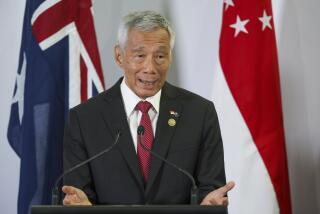Hong Kong’s Leader Assured New Term
- Share via
HONG KONG — Tung Chee-hwa, Hong Kong’s unpopular chief executive, in effect won his bid for a second five-year term Tuesday, but the manner of his victory left many disheartened about the potential for democracy in this quasi-autonomous Chinese region.
The electoral process proved so lopsided that Tung all but wrapped up his triumph merely by filing his nomination papers Tuesday at Hong Kong’s Registration and Electoral Office. Tung, running unopposed in a poll scheduled for late March, provided signatures of support from 706 of the territory’s 794 electors.
Because any candidate opposing him requires the backing of at least 100 electors, only the withdrawal of some Tung supporters could prevent him from being declared the winner immediately after the Feb. 28 deadline for filing nominations. With the names of each supporter public knowledge, any erosion is considered highly unlikely given Beijing’s support for Tung.
“I’m pleased to receive more than 700 nominations,” Tung, 64, said at the election office. “I hope we will be more united.”
Prominent political opponents immediately dismissed the entire electoral process as a farce.
“A sham,” declared Martin Lee, head of Hong Kong’s Democratic Party. Audrey Eu, an independent member of the region’s Legislative Council and one of the 88 electors who chose not to back Tung’s nomination, called Tuesday’s development “a tragedy of our electoral system.”
“Considering that Hong Kong is an advanced international city of 7 million people, it is unacceptable that the chief executive is elected by just 800,” she said. “This means he is not accountable to the public.”
Hong Kong is free to choose its chief executive under the terms of the de facto constitution that established the former British colony as a special administrative region of China nearly five years ago.
Under present rules, however, the voting is done indirectly by the select group of 794 residents, mainly well-connected professionals and other establishment figures.
The frustration of many critics stems from the belief that Tung won not because he is popular or has performed well in his first term but because of a very visible--and intimidating--endorsement from Beijing.
The nature of that backing from China’s Communist leadership, critics argue, gave the electors little choice but to support Tung.
When Tung announced in December that he intended to run for a second term, Hong Kong’s economy was sagging. One poll indicated recently that his public backing was 16%.
Despite his unpopularity, Tung’s opponents decided against putting up a candidate to challenge him, fearing that it would lend legitimacy to what they argue is a deeply flawed process. Because of this, several hot-button issues, including unemployment and education reform, aren’t likely to be addressed during the election period.
“The end result is that the gap between the ruling elites and the masses will widen,” Hong Kong University political scientist Sonny Lo predicted. “Tung now has to take urgent steps to improve his performance. Otherwise, this gap will only continue to widen.”
More to Read
Sign up for Essential California
The most important California stories and recommendations in your inbox every morning.
You may occasionally receive promotional content from the Los Angeles Times.













